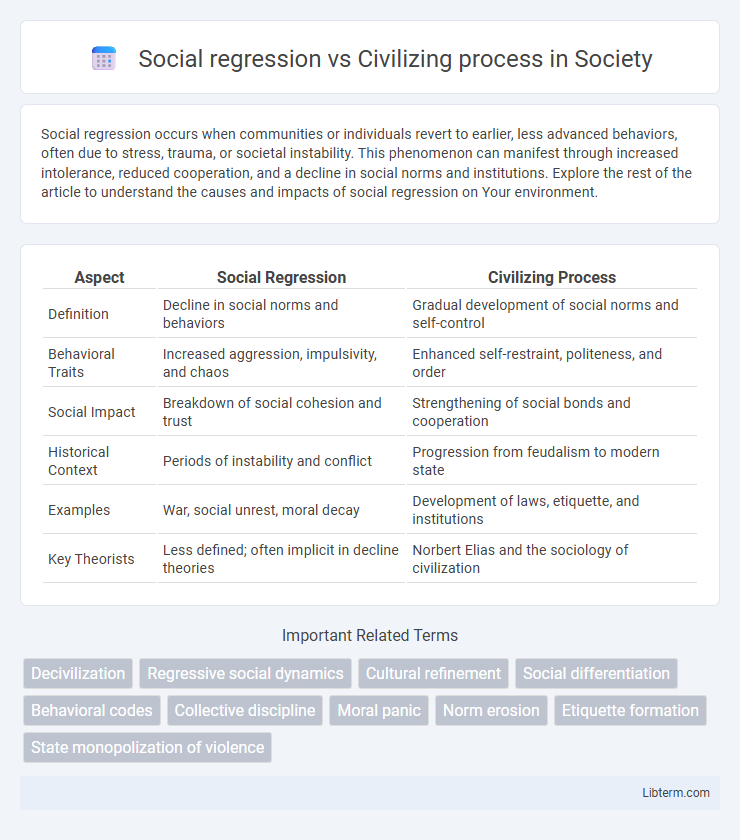Social regression occurs when communities or individuals revert to earlier, less advanced behaviors, often due to stress, trauma, or societal instability. This phenomenon can manifest through increased intolerance, reduced cooperation, and a decline in social norms and institutions. Explore the rest of the article to understand the causes and impacts of social regression on Your environment.
Table of Comparison
| Aspect | Social Regression | Civilizing Process |
|---|---|---|
| Definition | Decline in social norms and behaviors | Gradual development of social norms and self-control |
| Behavioral Traits | Increased aggression, impulsivity, and chaos | Enhanced self-restraint, politeness, and order |
| Social Impact | Breakdown of social cohesion and trust | Strengthening of social bonds and cooperation |
| Historical Context | Periods of instability and conflict | Progression from feudalism to modern state |
| Examples | War, social unrest, moral decay | Development of laws, etiquette, and institutions |
| Key Theorists | Less defined; often implicit in decline theories | Norbert Elias and the sociology of civilization |
Understanding Social Regression
Social regression refers to the deterioration or reversal of social norms, structures, and behaviors, leading to increased conflict, disorder, and erosion of collective values. It contrasts with the civilizing process, which involves the gradual establishment of self-control, social etiquette, and institutional development that promotes social cohesion and stability. Understanding social regression requires analyzing factors like economic decline, cultural disintegration, and loss of social trust that disrupt the mechanisms underpinning civilizing progress.
Defining the Civilizing Process
The civilizing process, as defined by Norbert Elias, refers to the long-term development of social norms and behaviors that promote self-restraint, politeness, and centralized control of violence, leading to increased social order and complex state formation. This process contrasts with social regression, where societies may revert to less regulated, more impulsive, and chaotic patterns of interaction. The civilizing process involves the internalization of social constraints through historical state formation, cultural refinement, and changing power dynamics.
Historical Contexts of Social Change
Social regression and the civilizing process represent contrasting dynamics within historical contexts of social change, where social regression often manifests as a decline in social norms, increased violence, and breakdowns in institutional order during periods of crisis or instability. The civilizing process, as theorized by Norbert Elias, describes the gradual development of self-control, social manners, and institutional regulations that stabilize societies over centuries. Historical shifts such as the transition from feudalism to early modern states illustrate how intensified central authority and social interdependence contributed to this civilizing trend, while periods of revolution or war frequently trigger social regression by disrupting these evolving social structures.
Key Theories: Norbert Elias and Beyond
Norbert Elias's civilizing process theory explores the gradual development of self-restraint, social norms, and complex structures of behavior that underpin modern societies, emphasizing long-term shifts in manners, state formation, and psychological changes. In contrast, social regression theories highlight reversals or breakdowns in social order, often linked to crises, conflict, or weakening social institutions, focusing on the erosion of norms and increased social disorder. Contemporary scholars extend Elias's framework by integrating insights from sociology, psychology, and political science to analyze how civilizing and regressive dynamics coexist, influence power relations, and manifest in globalized contexts.
Indicators of Social Regression
Indicators of social regression include rising crime rates, increasing social inequality, and weakening institutional trust, contrasting with the civilizing process which emphasizes behavioral self-control and stronger social norms. Declining educational attainment and deteriorating public health metrics also signal social regression, undermining societal cohesion and progress. These markers highlight a reverse trajectory from the civilizing process's focus on long-term social stabilization and refinement of interpersonal conduct.
Markers of Civilizational Progress
Markers of civilizational progress include increased social control, refined manners, and structured legal systems that reduce violence and promote cooperation. In contrast, social regression is characterized by the breakdown of these markers, leading to increased conflict, loss of social norms, and weakened institutions. The civilizing process highlights the gradual internalization of self-restraint and the development of complex social rituals that distinguish advanced societies.
Case Studies: Societies in Decline vs. Advancement
Social regression in case studies often reveals patterns of increased violence, weakened institutions, and cultural fragmentation, as observed in the decline of the Roman Empire and the collapse of Mayan civilization. Contrarily, the civilizing process, exemplified by European medieval societies transitioning through improved legal frameworks and state formation, shows advancement in social order and cooperative behavior. These comparative analyses highlight the interplay between socio-political stability and the long-term evolution or regression of complex societies.
Factors Driving Regression and Civilization
Social regression is driven by factors such as economic crises, political instability, and cultural fragmentation that undermine social order and collective norms. In contrast, the civilizing process hinges on the development of centralized states, legal institutions, and increased social interdependence that promote self-control and behavioral regulation. Both phenomena reflect complex interactions between power structures, social rituals, and the evolution of collective conscience in shaping societal cohesion or decay.
Impacts on Social Norms and Behaviors
Social regression often leads to the breakdown of established social norms, resulting in increased deviance, reduced social cohesion, and the resurgence of more archaic or violent behaviors. In contrast, the civilizing process promotes the internalization of self-control, refinement of manners, and the gradual development of cooperative social behaviors that underpin modern societies. These divergent dynamics significantly shape patterns of social interaction, influencing how communities enforce conformity and adapt to change.
Future Perspectives: Preventing Regression, Fostering Civilization
Future perspectives on preventing social regression emphasize the integration of education, technology, and inclusive governance to promote sustained civilizing processes. Emphasizing data-driven policy-making and cultural resilience supports the advancement of social norms and collective well-being. Prioritizing equitable access to resources and digital literacy enhances societal adaptability and long-term progress.
Social regression Infographic

 libterm.com
libterm.com